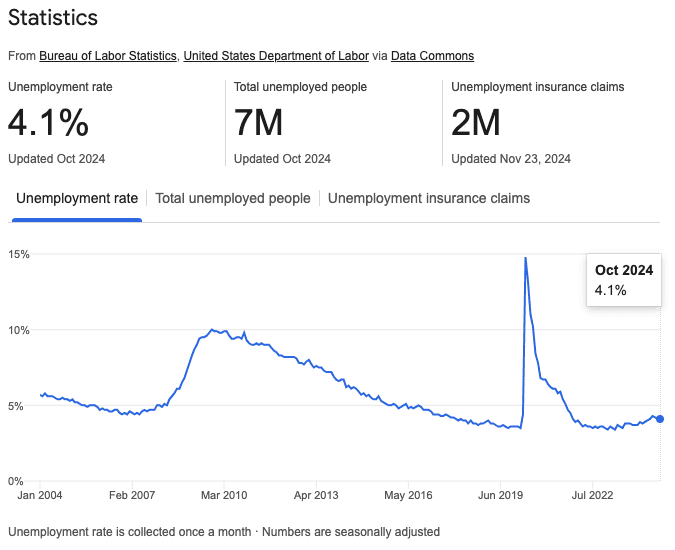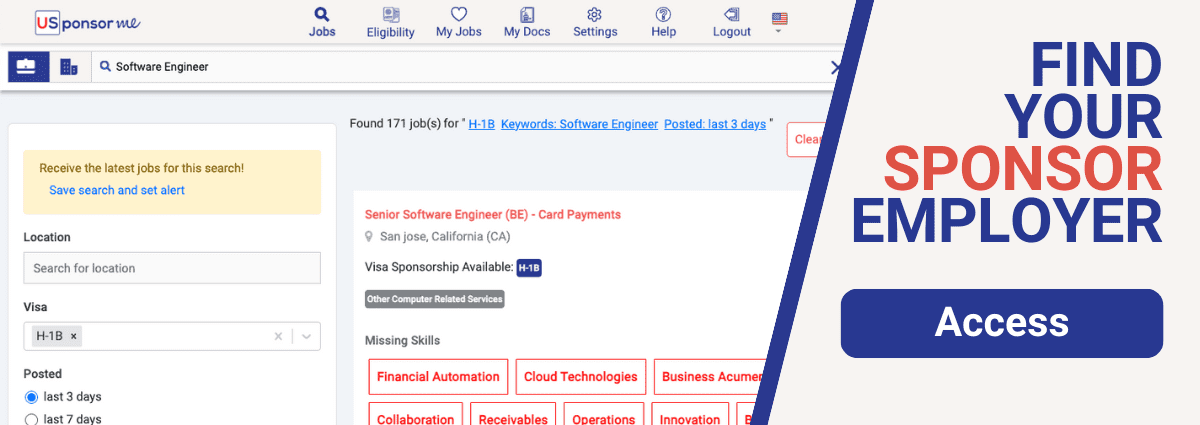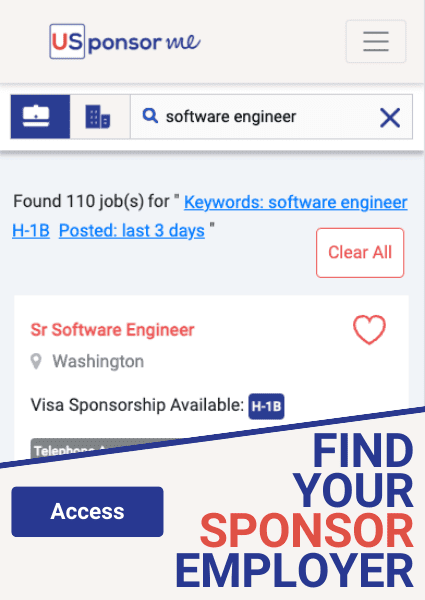Did you already ask yourself: why me and not an American Citizen? Here, I will show you all the job opportunities you can get in the USA as a foreigner or an international student.
Given our experience, I know how you feel about how hard it is to find a job as a foreigner or international student in the USA when a company can easily hire an American for a free spot.
You’re right. This is the case for 90% of the job market. Companies are pretty satisfied with local hiring and don’t need more. And you know what? Let them be in peace.
But what is happening with the 10% left? Do you think that it is easy for them to hire someone?
Even if American politics is not at the advantage of immigrants and foreigners today, as getting a visa in the USA is harder and harder, you still have your chances! Let me explain:
My language, my culture, my citizenship
The first point concerns your language and/or culture. We need you to represent your culture or language in a few kinds of jobs!
In this era of globalization, many companies think that international staff can be a keystone of a company’s ability to succeed in the global market that never stops. Let’s see all the job opportunities in this field you can get:
- If you speak a second (or more) language(s), it’s a real plus for the company!
It was the case for Max and me. As my company has its French quarter in Paris, they were looking for someone who could communicate well in both English and French.
- Culture understanding
If the company has a subsidiary or an office in your home country, which is very different from the culture of the United States, the company needs someone who can manage with people in your culture, and they need you. They cannot go further without someone like you.
- If the founder, executive, or manager of the company has the same citizenship as you
It depends on how long these people have stayed in the US, but those are more likely to hire people who fit the most with their thoughts. And they are more than you think… For example, Los Angeles has around 4 million people. Following public records, 37.7% of the Los Angeles residents are Foreign-born population (around 1.5 million), from which 6.5% (98,029) are from Europe, 29.9% (447,826) are from Asia, 1.6% (24,339) from Africa; and 61.6% (924,078) from Latin America. See more here! Is that not crazy? You can do the same research for other cities like New York City, San Francisco, Miami, etc.
- Also, if the company has its headquarters in your home country and has subsidiaries or offices in the United States of America
It’s quite possible. The company’s policy is to have a percentage of people of your nationality so that we do not forget the company’s source and work in harmony with different points of view.
- Everywhere in the USA where there are people of the same citizenship/language as yours, you will find services in this language.
Because clients with your citizenship/culture/language are here! They need assistance in their language or services. It can be schools, teachers (parents want their children to conserve the language), accountants for foreign entrepreneurs (with double skills accounting in your country and the US), lawyers (with double bar to deal with investors/international entrepreneurs), real estates (double languages, double skills) for people who arrive and have no idea how to deal to find a house, church (different religion and culture), even public services (you will find public services like DMV which offer services in Spanish), etc.
- It can also be the case the company wants to cultivate a brand image.
For example, French people in the USA are famous for luxury, fashion, food, and wine. So it’s not unusual that international brands like LVMH or L’Oréal always look to hire French people in the United States of America at every stage, every position. The same thing applies to French restaurants: to diffuse authenticity to the clients, they always look to hire a French cook, French waiter, etc.
How is your culture famous in the US?
- Also, you can serve your own country from the USA.
In that case, it’s your country’s government or private companies that send you to the USA to report and/or deal with American representatives in private or public. It concerns journalism, military, government diplomacy, research laboratories, universities, international organizations, etc.
The difficulty of the company to hire in local
Trust me or not, it happens A LOT, depending on your sector. In January 2024, the USA’s unemployment rate edged to 3.7 percent. Labor shortages in the United States have emerged as a critical issue in recent years, characterized by a significant gap between the demand for labor and the available workforce. A labor shortage occurs when job openings exceed the number of qualified individuals in the USA willing to fill those positions.

Companies have a hard time hiring locally because of:
- A lake of skilled people in the U.S. market
Labor shortages across various occupations in the United States have become increasingly pronounced in essential sectors such as healthcare, engineering, and technology.
The healthcare sector, for instance, is facing a significant shortfall of nurses and physicians. The aging population and the ongoing impact of the global pandemic have intensified the demand for healthcare professionals, with projections indicating a continued upward trend in job opportunities. Registered nurses, for example, ranked among the top occupations for projected job growth, as they are essential to patient care across various healthcare settings.
Software developers and IT support specialists are in high demand in the technology sector due to the rapid advancement of technology and digital transformation across industries. Companies increasingly rely on technology to maintain a competitive edge, thereby driving the need for skilled workers to develop and maintain these systems. The skill set required for these positions is often technical, encompassing programming languages, cybersecurity knowledge, and troubleshooting capabilities. Moreover, wage scales for technology jobs tend to be elevated, reflecting the high demand for professionals who can navigate this complex landscape.
- A labor shortage in some occupations
The hospitality industry, heavily impacted by the pandemic, is witnessing a significant labor shortage. Many workers have left the sector for various reasons, including concerns about job security and better opportunities elsewhere. Positions at the front desk, food & beverage, and culinary positions in restaurants and hotels are in high demand.
Manufacturing and construction also face significant labor shortages, compounded by a shrinking workforce and an aging demographic. Many manufacturers and construction companies struggle to find skilled labor that meets current technological advancements, which demand higher expertise.
- A high seasonal need
It concerns companies that suddenly need hundreds of employees to strengthen labor. It often happens for seasonal peaks of sales or seasonal works, like winter or summer activities, or during special events. It can also be when the company wins a big contract and sells thousands of products. Some companies do not require any experience and/or skills; you’ll be trained.
The agriculture sector also experiences unique challenges, with labor shortages affecting the timely harvesting of crops and overall productivity. Seasonal work demands, compounded by immigration laws and a decline in interest among local workers, have led many farms to struggle with meeting labor needs.
- A decline in interest among local workers
Local workers who are U.S. citizens or permanent residents can quit the company when they want, and it can be challenging for the company to hire someone else quickly and keep paying costs for each hiring! The median tenure for workers aged 25 to 34 is 3.2 years; for employees aged 65 and over, it is 10.3 years. They know it’s much harder for a foreigner to quit and work for another company because of the visa.
You won’t be as flexible as you could be as an American or a Green Cardholder. You must find another company that wants to sponsor your visa and alert your organism or the USCIS that you wish to change your employment/employer. You are not alone, and the administrative stuff is challenging and painful each time you want to change your employer. Trust me, you don’t want to experiment with that a lot, and you don’t want to show your company you intend to do that (because it’s an advantage for the employer to hire you). On the other hand, the company can fire you at any time. So it’s a significant benefit for them! It often attracts small companies that do not have a high budget.
If I have a recognized talent, I’m welcome in the US!
It depends on your work area, but if you have a recognized talent, the USA will love that! They like to have talented people from all over the world serve and represent the country because you will now represent the country and help raise the general level.
So this case is a bit different because the visa is only for you and your talent. You will be able to start the visa application without any sponsoring company. You will need one, but in the end, to prove that you will use your talent in the USA, the company won’t need to do something in particular. The approach with the company will be completely different, as it is actually for all kinds of visas.
Job opportunities in my current company
It’s not really because you have exceptional skills that nobody has in the US or because you are from a particular country. It’s because your company, which you are currently working on, needs you in the USA for some reason!
You have worked in the company for a while and know how the company works and how your job is at this company, and you are a very good element that the company cannot replace. So it will be hard for the company to find and train someone exactly like you in a foreign country they don’t yet know, which is, in our case, the United States of America. So it will be much easier for them to transfer you to the US than to hire and train somebody new to do the same job as you do.
It often happens when a company in your home country wants to expand its product and services into the USA.

Exchange Program as an Opportunity
You have a great pathway to gain experience in the U.S. through an exchange program.
The United States is historically a nation of immigrants, built by generations of people who came from abroad. That spirit of openness continues today—Americans are naturally receptive to welcoming internationals into their workplaces.
For host companies, exchange programs are cost-neutral—bringing you on board costs them no more than hiring a local candidate. That’s because you, the candidate, cover the program fees, making it an easy decision for employers. Additionally, the visa process is fast and efficient, with many cases taking as little as two weeks to receive the necessary documents to schedule a U.S. embassy appointment.
This combination of no extra cost and a quick process makes employers much more open to hosting international candidates. This means that hiring you is not a burden—it’s an opportunity. You bring fresh perspectives, global experience, and motivation to learn, while costing employers no more than a U.S. hire. As long as you can start when they need and adapt to the role, most employers see your participation as a real advantage.
The only consistent expectation is a good level of English, though the required fluency depends on the role.
Most importantly, an exchange program can be a stepping stone for your U.S. career. It allows you to gain valuable work experience, build connections, enhance your English skills, and adapt to the American workplace culture. All of this can make you a much stronger candidate and boost your international career.
At USponsorMe, we specialize in J-1 program placement and visa assistance. From connecting you with the right host company to guiding you through the visa process, we make your U.S. journey smooth and stress-free. 🌎✈️ Ready to start your American experience? Apply here and take the first step today.
In conclusion…
The more you match those kinds of needs, the more you will have the chance to get hired.
It worked for both of us because we combined three of the points above: our companies were small, managed by French people, and we work in IT, which is highly demanded in the US.
And it works for lots of my students: One was in the quality/security sector and hired in a medium-sized business managed by people in her citizenship. Another was in the marketing/communication sector and employed in a small company also managed by people in his citizenship. One was hired as a language teacher in an international school. One was in the arts and sculpture sector. One was in waste management in a small company, etc. You can see here all the testimonials.
Those guys, like us:
- were not in the US to do our job search. They were in Asia, New Zealand, Europe, etc.
- I don’t have an American degree or diploma from prestigious universities,
- and I was not bilingual in English, but I had a good level for some of them anyway.
- I knew nobody in the US before moving here except me. 🙂
We didn’t have all of that either. We were in Europe at that time, and we did it anyway. But we found a way to accomplish our long quest to get a job in the USA. So why not you?






